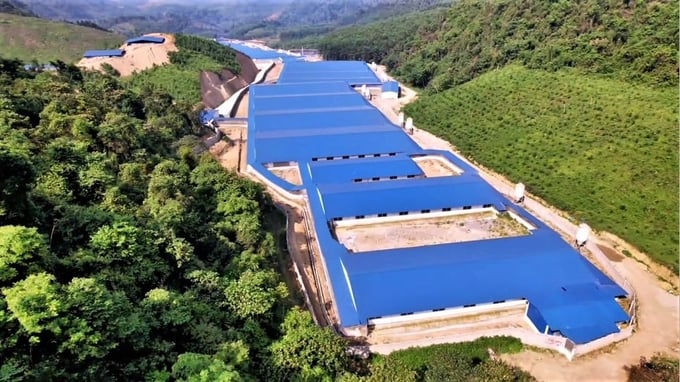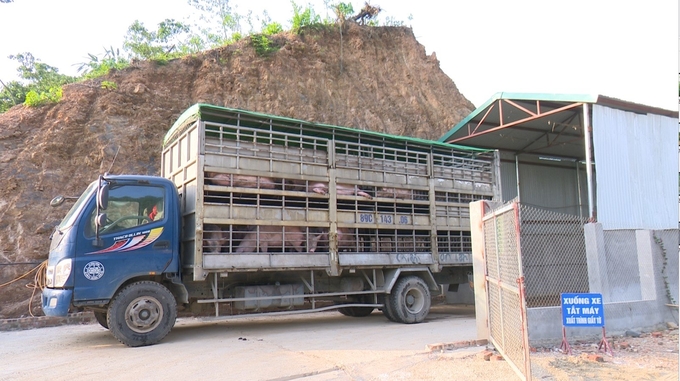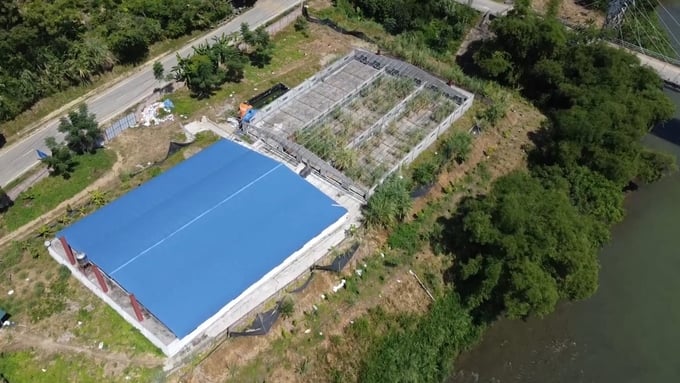June 21, 2025 | 01:36 GMT +7
June 21, 2025 | 01:36 GMT +7
Hotline: 0913.378.918
June 21, 2025 | 01:36 GMT +7
Hotline: 0913.378.918

A pig farming project in Na Ri district (Bac Kan province). Photo: Ngoc Tu.
Bac Kan is a mountainous province in the center of northeastern Tonkin, encompassing nearly 486,000 hectares of natural land, of which 85 percent is forest territory. Under an economic development orientation, agriculture and forestry play a significant role, with reforestation and industrial wood processing development as the focal points.
Long underdeveloped on a small and fragmented scale, the livestock production sector has only two enterprises and thirty cooperatives of small and medium scale in Bac Kan province as of 2020. Since 2021, however, an increasing number of businesses have increased their investments in livestock production in these regions.
Within the past two years, the province of Bac Kan has approved 16 pig husbandry projects from 15 businesses and cooperatives, with a total registration capital of nearly 1,800 billion VND. These enterprises have an annual scope of 20,000 sows and 249,000 meat pigs.
Bac Kan province has completed and put into operation eight projects to date, including the High-tech pig breeding investment project of Bac Kan Agricultural Development Investment Joint Stock Company, the investment project on commercial pig farm and purebred sows of Nam Hue Company Limited, and the Super lean pig breeding and pork farm project of Bac Kan Construction Materials Production Joint Stock Company.
Successfully implemented pig farming initiatives have significantly contributed to the concentration of pig farming in the region. The total pig herd of enterprises and cooperatives exceeds 20 percent of the province's total pig herd.
Some specialists, in describing the investment surge in Bac Kan livestock production, noted that the undeveloped space for pig farming development in Bac Kan is vast and the land bank for this activity is abundant. Especially after the introduction of the 2018 Law on Livestock Production and certain regulations pertaining to lengthening the distances between livestock farms and residences have prompted a number of businesses to relocate to Bac Kan due to the favorable population density, whereas the density of low-lying land makes it difficult to comply with the regulations.
Mr. Dinh Quang Tuyen, Standing Vice Chairman of the Bac Kan People's Committee, has determined that Bac Kan is presently a province with significant potential for livestock development in the region and the nation as a whole. Bac Kan has large land conditions, a large land fund for livestock husbandry, a sparse population, and a high forest coverage rate (over 73%), so its environmental impact will be lower than that of other provinces. Consequently, in recent years numerous businesses have invested, primarily in swine farming initiatives.

Bac Kan has not yet formed a value chain from pig farming, commercial pigs are mainly consumed in other provinces. Photo: Ngoc Tu.
Although certain results have been obtained, reality demonstrates that pig farming development in Bac Kan province still has many problems that need to be resolved. The province lacks a comprehensive plan for concentrated livestock agricultural areas so that investors can choose project locations proactively.
Currently, investments in pig farming benefit from corporate income tax incentives, land rent exemptions, and reductions, so their contribution to the local budget is negligible.
Mr. Nong Quang Nhat, Vice Chairman of the People's Committee of Bac Kan province, stated that in the past two years, when the surge of livestock investment migrated from lowland provinces to mountainous provinces, Bac Kan initially lacked many options.
The majority of implemented initiatives are still modest and medium-sized and have not attracted significant corporations and businesses. There is no abattoir or value-adding deep processing of swine products in the province, nor are there any animal feed processing factories.
In a recent survey, the People's Council of Bac Kan province determined that, due to a lack of training in animal husbandry techniques among local employees, the majority of businesses hire workers from outside the province. The objective of establishing employment and increasing the income of local residents has not been met.
Despite the fact that swine farming initiatives have not made a significant contribution, environmental concerns are always present. According to the results of the People's Council of Bac Kan province's monitoring of five active projects, four are subject to large-scale livestock farming, but only one has been granted a Certificate of Eligibility for large-scale livestock farming.
People have lodged environmental pollution complaints against the majority of swine farms that have been established. Particularly, electors have reported on multiple occasions that the investment project on a commercial pig farm and purebred sows in group 1A, Duc Xuan ward (Bac Kan city) causes air pollution.
The project for breeding pigs and super lean pigs in Na Ngai village, Thanh Thinh commune (Cho Moi district) does not meet the distance requirements from residential areas; the project for a super lean pig farm in My Thanh commune (Bach Thong district) does not meet the distance requirements from water sources and poses a high risk of polluting the Cau River. Despite the Department of Natural Resources and Environment's inspections and handling of violations, businesses have made corrections, but they are not comprehensive.

Bac Kan minimizes small and medium-scale pig farming projects. Photo: Ngoc Tu.
Many businesses have recently expressed an interest in implementing pig husbandry initiatives in the Na Ri district. To date, four projects have been licensed, with one project already operational (scale of 2,500 sows per year), two projects implementing construction components, and one project concluding land procedures.
Mr. Luong Thanh Loc, Vice Chairman of the Na Ri District People's Committee, stated that the district is currently evaluating the efficacy of licensed projects before implementing the subsequent policy. The district's goal is not to attract an excessive number of pig farming projects; it will only consider investment areas that are remote from residential areas, protect the environment, and have inefficient agricultural and forestry production land.
According to information from the Bac Kan Department of Planning and Investment, the department has proposed limiting or rejecting the investment policy of unplanned swine farming projects. For projects that are implemented slowly or not at all, the province will be required to halt operations and reclaim the allotted land for use in other domains.
Mr. Nong Quang Nhat, Vice Chairman of the People's Committee of Bac Kan province, reported that the Standing Committee of the Provincial Party Committee has assigned party officials of the Provincial People's Committee to direct departments and branches to review all pig farming projects and evaluate their results and limitations in recent years in order to develop specific regulations on the criteria and conditions for attracting investment in this field.
Translated by Linh Linh

(VAN) The waste of resources from agricultural by-products and the situation of counterfeit and poor quality goods in production causing losses of thousands of billions were pointed out by the National Assembly deputy.

(VAN) After 5 years of implementation, the CAI initiative has helped coffee growers change their farming practices, moving toward responsible agriculture that meets global export standards.

(VAN) The primary prerequisite for the comprehensive and robust integration of Vietnam's livestock sector into the global value chain is the establishment of a disease control system.

(VAN) The results of national programs are essential for establishing a contemporary livestock sector that is well-equipped to meet the demands of both domestic and international markets, with robust biosafety standards.

(VAN) The UNESCO Global Geopark revalidation of Non nuoc Cao Bang and the transition to a two-tier administrative model are presently undergoing a pivotal moment in Cao Bang, the northernmost province of Vietnam.
/2025/06/13/5330-2-004539_953.jpg)
(VAN) Changing policy mindset and removing investment barriers are urgent requirements to open up new development space for enterprises in the agricultural sector.

(VAN) The areas include the restoration of five million hectares of marine ecosystems.